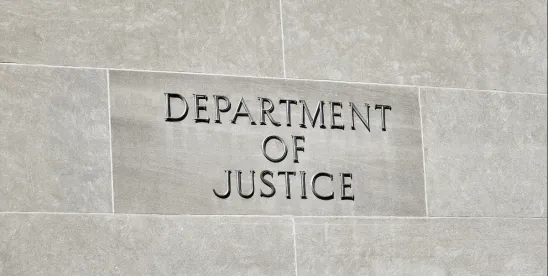On May 12, 2025, the U.S. Department of Justice (DOJ) issued a memorandum outlining the Criminal Division’s enforcement priorities and policies for prosecuting corporate and white-collar crimes in the new Administration. Later that week, Matthew R. Galeotti, head of the DOJ’s Criminal Division, addressed the new policies in a speech at the SIFMA Anti-Money Laundering and Financial Crimes Conference. Galeotti emphasized that the DOJ is “turning a new page on white-collar and corporate enforcement,” with a renewed focus on crimes that pose the greatest risk to U.S. interests. His remarks, coupled with the recent expansion of the DOJ’s Corporate Whistleblower Awards Pilot Program, signal a new era of accountability, transparency, and proactive compliance for portfolio companies operating in high-risk sectors.
Voluntary Self-Disclosure Policy – a Clear Path to Declination
The new policies include revisions to the Corporate Enforcement and Voluntary Self-Disclosure Policy (CEP). The revised CEP is designed to provide clearer guidance on the benefits of cooperation and a more predictable resolution process. Notably, companies that voluntarily self-disclose misconduct (in a “reasonably prompt” manner), fully cooperate, remediate appropriately and promptly, and have no aggravating circumstances will now receive a declination — not merely a presumption of a declination as previously offered. Moreover, a declination is still possible for cases with aggravating circumstances as prosecutors will have discretion to weigh the severity of those aggravating circumstances against the company’s cooperation and remediation efforts. Finally, the policy provides additional flexibility for companies that self-disclose in good faith where the government is already aware of the misconduct — such companies may still qualify for significant benefits, such as reduced fines and the avoidance of compliance monitors.
Expansion of the Whistleblower Pilot Program
While incentivizing self-reporting and cooperation, the new policies significantly broadened the scope of the Corporate Whistleblower Awards Pilot Program, announced in August 2024. Originally limited to violations by financial institutions, foreign and domestic corruption (including FCPA violations), and certain health care frauds, the program now covers a wider array of misconduct, including:
- procurement and federal program fraud;
- trade, tariff, and customs fraud;
- violations of federal immigration law;
- violations involving sanctions;
- material support of foreign terrorist organizations, or those that facilitate cartels and transnational criminal organizations, including money laundering, narcotics, and Controlled Substances Act violations.
This expansion tracks the newly announced enforcement priorities and reflects the DOJ’s recognition that financial crime is often intertwined with broader threats to national security and global stability.
Competing Incentives for Whistleblowers and Companies
The financial incentives for whistleblowers who provide actionable information remain substantial. If a whistleblower provides information that leads to a successful forfeiture exceeding $1,000,000 in net proceeds, the whistleblower can receive up to 30% of the first $100 million in net forfeitures, and up to 5% of amounts between $100 million and $500 million.
At the same time, the incentives for companies to self-report a whistleblower complaint and still be eligible for a declination remain even stronger. Indeed, the Corporate Whistleblower Awards Pilot Program has an exception — if a whistleblower makes both an internal report to a company and a whistleblower submission to the Department, the company will still qualify for a presumption of a declination of charges under the CEP — even if the whistleblower submits to the Department before the company self discloses — provided that the company: (1) self-reports the conduct to the Department within 120 days after receiving the whistleblower’s internal report; and (2) meets the other requirements for voluntary self-disclosure and presumption of a declination under the policy.
What This Means for Companies
The message to corporate America is clear — compliance is a strategic imperative. Therefore, companies must:
Strengthen Internal Controls: Ensure compliance programs are tailored to the company’s risk profile and are actively monitored and updated.
Encourage Internal Reporting: Foster a culture where employees feel empowered to report concerns internally before going to regulators.
Review Investigation Protocols: Update internal investigation and remediation procedures to align with DOJ expectations.
Act Proactively: Voluntary self-disclosure and cooperation can significantly mitigate penalties and reputational damage.
Key Takeaways
The DOJ’s recent moves — both in policy and tone — reflect a maturing enforcement philosophy. Rather than wielding the stick indiscriminately, the Department is offering a clearer path for companies to do the right thing and receive the full benefits of cooperation. But the stakes remain high. With an expanded whistleblower program and a renewed focus on high-impact crimes, the cost of non-compliance has never been greater.
For portfolio companies willing to invest in integrity and transparency, the DOJ’s evolving framework offers not just protection — but opportunity.
Seetha Ramachandran, Nathan Schuur, Robert Sutton, Jonathan M. Weiss, William D. Dalsen, Adam L. Deming, Adam Farbiarz, and Hena M. Vora contributed to this article








 />i
/>i
